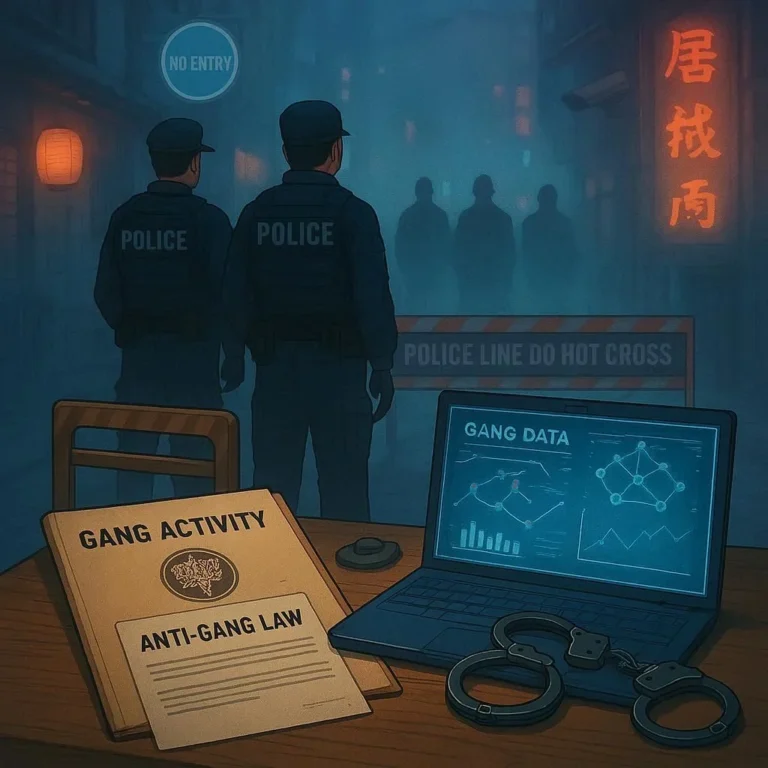505 views The Business Strategies Behind Yakuza Success
Unveiling the Business Acumen of the Yakuza
The Yakuza, Japan’s infamous organized crime syndicate, is often viewed through the lens of its criminal activities. However, beneath the surface lies a complex and highly structured organization that has thrived for decades. While their methods are unquestionably controversial, the Yakuza’s success can be attributed to a series of shrewd business strategies that are as calculating as they are effective. In this blog post, we’ll delve into the business tactics that have allowed the Yakuza to maintain its grip on power and profitability.
The Hierarchical Structure: A Lesson in Organizational Efficiency
One of the most striking aspects of the Yakuza’s operational model is its rigid hierarchical structure. Modeled after traditional Japanese feudalism, the organization is built on a clear chain of command, with each member knowing their role and responsibilities. This structure is not dissimilar from that of a large corporation, where clear lines of communication and defined roles are essential for efficiency.
At the top of the hierarchy is the oyabun (father figure), who serves as the leader and decision-maker for the organization. Below him are the wakagashira (lieutenants) and shateigashira (heads of secondary divisions), who oversee specific operations and ensure that orders are carried out. This level of organization allows the Yakuza to operate with military-like precision, minimizing internal conflicts and maximizing efficiency.
A Code of Conduct: Trust and Loyalty as Cornerstones
The Yakuza’s success is also rooted in its adherence to a strict code of conduct, known as giri (duty) and ninjō (human feeling). While this code is often romanticized in popular culture, it plays a crucial role in maintaining trust and loyalty within the organization. Members are expected to uphold the group’s code of honor, which includes unwavering loyalty to the organization and the protection of its interests.
This code of conduct not only fosters internal cohesion but also serves as a tool for maintaining control. By instilling a sense of duty and honor, the Yakuza creates a culture where betrayal is unthinkable, reducing the risk of internal power struggles and external threats.
Diversification of Revenue Streams
Like any successful business, the Yakuza understands the importance of diversifying its revenue streams. While they are historically associated with activities such as extortion and gambling, the organization has evolved to meet the demands of a changing world. Today, the Yakuza is involved in a wide range of legitimate and illegitimate businesses, including:
- Real Estate: The Yakuza has long been involved in Japan’s lucrative real estate market, often through proxy companies or shell corporations.
- Construction: They control or influence numerous construction projects, sometimes through coercion or bid-rigging.
- Entertainment: The Yakuza has ties to the entertainment industry, including nightclubs, casinos, and adult entertainment.
- Finance: They have been known to invest in legitimate financial institutions or operate loan-sharking operations.
- Technology: In recent years, the Yakuza has even ventured into the tech sector, with some groups involved in online fraud and cybercrime.
By diversifying its operations, the Yakuza has managed to remain profitable even as law enforcement efforts and societal changes have targeted traditional organized crime activities.
Strategic Expansion and Adaptation
Another key factor in the Yakuza’s success is its ability to adapt to changing circumstances. As Japan’s economy and society have evolved, so too have the Yakuza’s strategies. For example, during the economic boom of the 1980s, the Yakuza capitalized on the influx of wealth by expanding into new markets, including the stock market and real estate speculation. When the bubble burst in the early 1990s, they shifted their focus to other lucrative areas, such as the entertainment and construction industries.
In addition to domestic operations, the Yakuza has expanded its influence internationally. They have established operations in countries such as the United States, China, and the Philippines, where they engage in activities ranging from drug trafficking to human smuggling. This international expansion has allowed the Yakuza to diversify its operations and reduce its reliance on any single market.
Marketing and Branding: The Yakuza’s Image
While the Yakuza’s image is often associated with fear and intimidation, it is also carefully cultivated to convey a sense of power and authority. This branding serves as a form of marketing, deterring competitors and reinforcing the organization’s reputation for ruthlessness.
The Yakuza’s branding extends beyond its visual identity, which often includes elaborate tattoos and tailored suits. Their public persona is designed to instill respect and fear, ensuring that their influence is felt even in the legitimate business world. This image is reinforced through their interactions with the media, where they often present themselves as Robin Hood-like figures,protecting the weak and upholding a code of honor.
Leadership and Recruitment Strategies
The Yakuza’s leadership and recruitment strategies are also key to its success. Unlike other criminal organizations, the Yakuza places a strong emphasis on loyalty and continuity. Leaders are chosen based on their experience, loyalty, and ability to maintain order within the organization. This approach ensures that leadership transitions are smooth, minimizing the risk of internal power struggles.
Recruitment is another area where the Yakuza has shown adaptability. Historically, they recruited members from the fringes of society, such as burakumin (Japan’s marginalized outcast communities) and individuals with criminal records. However, in recent years, they have expanded their recruitment efforts to include younger, more educated individuals who can help the organization navigate the complexities of modern business.
The Role of Finance and Money Management
No discussion of the Yakuza’s business strategies would be complete without addressing their financial management practices. The organization has a sophisticated system for managing its finances, which allows it to maintain profitability even in the face of economic challenges.
The Yakuza’s financial acumen is evident in its ability to launder money and invest in legitimate businesses. By funnelling illegal proceeds through shell companies and offshore accounts, the Yakuza is able to clean its dirty money and reinvest it into profitable ventures. This not only helps the organization maintain its financial stability but also legitimizes its operations, making it more difficult for law enforcement to target their activities.
The Yakuza’s Global Expansion and Future Prospects
The Yakuza’s success is not confined to Japan. Over the years, they have expanded their operations to various parts of the world, establishing a global network that allows them to engage in a wide range of criminal activities. From drug trafficking in Southeast Asia to money laundering in Europe, the Yakuza has demonstrated an ability to adapt to new markets and exploit emerging opportunities.
Looking ahead, the Yakuza’s future prospects appear uncertain. As law enforcement agencies around the world become more sophisticated in their efforts to combat organized crime, the Yakuza faces increasing pressure to evolve and adapt. However, given their centuries-long history of resilience and adaptability, it is unlikely that this organization will disappear anytime soon.
Conclusion: Learning from the Yakuza’s Business Model
While the Yakuza’s activities are undeniably criminal, their business strategies offer valuable lessons for any organization. From their hierarchical structure and code of conduct to their diversification of revenue streams and financial management practices, the Yakuza’s success is a testament to the power of careful planning and strategic thinking.
Of course, it’s important to remember that the Yakuza’s success comes at a significant cost, including human suffering and societal harm. However, for those interested in understanding the mechanics of organized crime, the Yakuza’s business strategies provide a fascinating case study.
Call to Action: What do you think about the Yakuza’s business strategies? Share your thoughts in the comments below. If you found this article insightful, please share it with your network.
Learn more about the Yakuza and their impact on Japanese society.
Discover how the Yakuza’s business tactics compare to other organized crime groups worldwide.
Further Reading:







